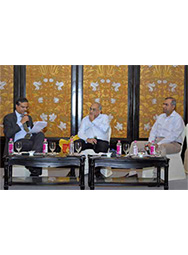
Investing in Knowing Investments
Last Tuesday afternoon, Rotarians were privileged to witness a panel discussion between legendary stock market expert Bharat Shah and accomplished macro trends expert Manish Chokhani about the current state of the stock market and the prospect of investing in a seemingly mature bull market. Moderated by Rtn. Dipan Mehta, the discussion was an informative dialogue for the layman and a great conversation for stock market enthusiasts.
Mehta initiated the discussion by acknowledging the hesitation of some investors with regard to an oversaturated market, questioning whether this worry was justified. Shah promptly denied the validity of their worries, stating the distinction between threats and concerns. The stock market isn’t a place of a calm, serene existence – there are constant challenges; the threats need to be fleshed out and the challenges need to be dealt with. Alerting investors, Shah said, “Getting consumed by worries is inexcusable because every day brings new concerns and problems.” Chokhani added that the only time to be cautious is when investing in companies that are not well researched or understood.
Continuing the discussion with a question, Mehta inquired about the major risks that may not be quite visible in India’s current bull market. Revisiting the last three decades of the country’s market, Chokhani pointed out the ongoing problem of oil, inflation, fiscal deficit, and political issues. However, there have been no macro issues in this bull market, and companies have only compounded, creating enormous wealth creation opportunities for the country. The larger worry, he points out, is global. There may be something worrisome considering the imbalance in the GDP and the debt of other countries, and “if something pricks the bubble globally, we suffer from that.” But in isolation, the country does not have many concerns regarding its high savings rate, valuations, growing GDP, and the rich government, owing to its ability to privatise.
Concluding this question, Mehta discussed his belief: the bull market is quite safe currently, in comparison to past bull markets that were marked with scams and scandals, and this has increased investor confidence. Does this mean that the stock market has made progress and is safe and honest now?
With an enthusiastic ‘yes,’ Shah appreciated investors’ long-term business acumen in contrast to investors of yesteryear, who lacked predictability about the economy. “Riding a rising boat because a tide is rising is a fundamentally flawed approach to participating in investing,” he stated. Instead, Shah proposed a four-step solution:
1. Identify good businesses
2. Identify good people to run the businesses
3. Ensure that the business is atop a large size opportunity
4. Purchase quality franchises at a sensible price
According to the stock market expert, any market is theoretically safe if a capable analyst follows the above while investing.
The panelists were then asked to comment on the assumption that Indian markets are overpriced, due to listed companies presently having high P/E valuations relative to other emerging markets. Rejecting the statement that the valuations are overpriced, the panelists justified them, as Indian companies have a higher potential for growth than their foreign counterparts like Japan.
To conclude the discussion, Mehta questioned the classification of large cap and mid cap investments and the justification of their usage. Shah challenged the notion of categorisation itself, urging investors to focus on the attributes that create value in the business, stating that it is “not only an intellectually bad idea, but also a misleading one,” much like the notion of not judging the book by its cover. It is, after all, the growth that matters.
Winding up with a refreshing round of rapid-fire, Mehta asked the guests of honour if they thought positively or negatively about businesses in various sectors, as well as future scenarios such the result of the 2019 elections and investing in Tata Steel – but that is classified for the attendees.
